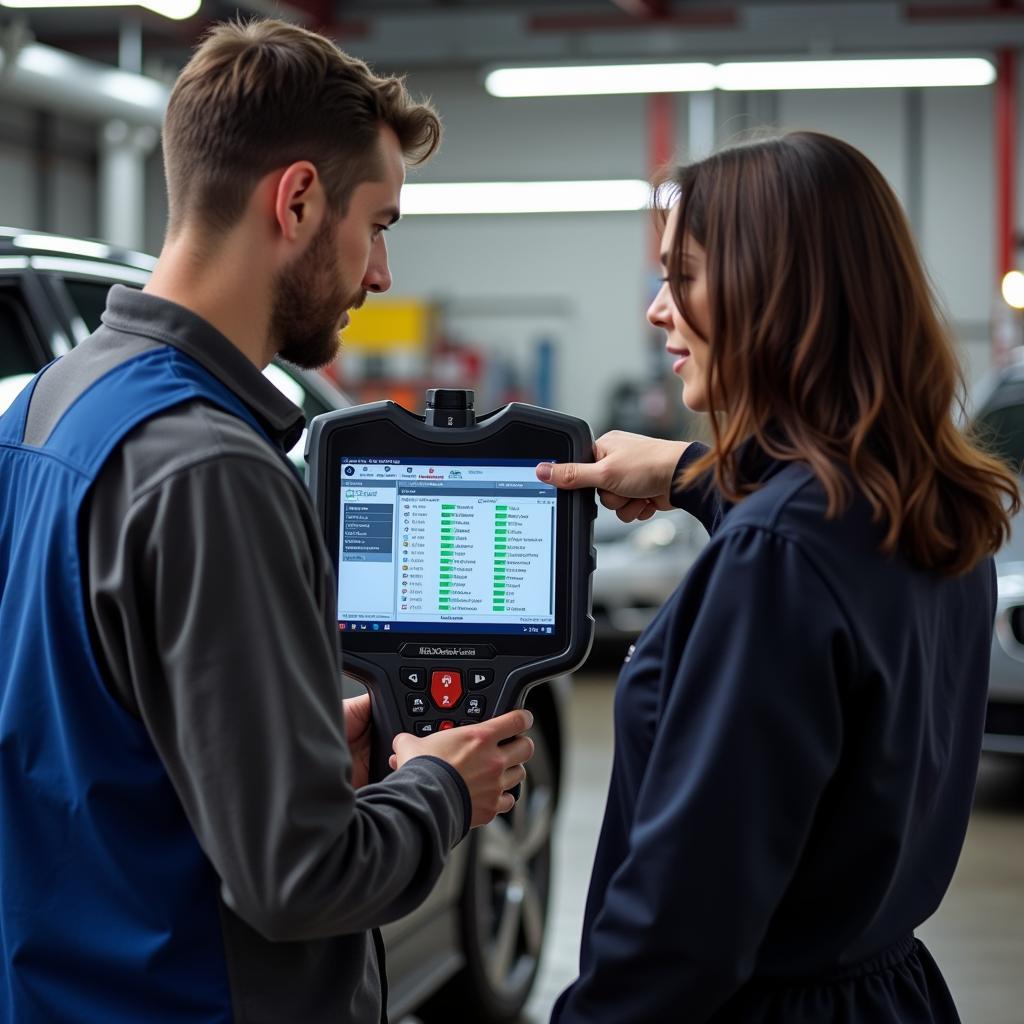Modern vehicles are more complex than ever, packed with intricate systems and sophisticated electronics. When a problem arises, pinpointing the cause can be challenging without the right tools and knowledge. That’s where diagnostics tests for cars come in. These tests, often performed with a specialized car diagnostic tool, can save you time, money, and unnecessary headaches by quickly identifying the root of automotive issues.
What are Car Diagnostic Tests?
Car diagnostic tests involve plugging a scan tool into your vehicle’s onboard computer system, known as the OBD-II port (On-Board Diagnostics). This port allows the scan tool to communicate with the car’s computer, retrieving diagnostic trouble codes (DTCs) and live data streams from various sensors.
Think of these tests as a conversation between your car and a mechanic. The car, through its computer system, speaks in codes, reporting any anomalies it detects. The scan tool acts as the translator, interpreting these codes and presenting them in a user-friendly format.
Why are Car Diagnostic Tests Important?
Gone are the days of relying solely on mechanical intuition and visual inspections to diagnose car problems. Diagnostics tests provide a more accurate and efficient way to identify issues, ultimately saving you time and money on repairs. Here’s why:
- Early Detection: Diagnostic tests can reveal potential problems before they escalate into major (and expensive) repairs.
- Accurate Diagnosis: Instead of relying on guesswork, mechanics can use the precise information from diagnostic tests to pinpoint the exact cause of a problem.
- Cost-Effective Repairs: By accurately identifying the issue, diagnostic tests prevent unnecessary part replacements and labor costs.
- Improved Vehicle Performance: Addressing issues promptly through diagnostic testing can help maintain optimal vehicle performance and fuel efficiency.
Types of Car Diagnostic Tests
There are various types of diagnostic tests for cars, each providing valuable insights into different aspects of your vehicle’s health:
1. Engine Diagnostic Test:
This test focuses on the heart of your vehicle – the engine. It checks for issues related to:
- Emissions: Ensuring your car meets environmental standards.
- Fuel System: Analyzing fuel pressure, injector performance, and more.
- Ignition System: Diagnosing problems with spark plugs, ignition coils, and other components.
- Air and Fuel Ratio: Monitoring the mixture of air and fuel for optimal combustion.
2. Transmission Diagnostic Test:
This test delves into the intricate world of your vehicle’s transmission system, checking for:
- Shifting Problems: Identifying issues with gear engagement and shifting smoothness.
- Fluid Levels and Condition: Analyzing transmission fluid quality and potential leaks.
- Clutch Performance: Evaluating clutch operation and potential wear in manual transmissions.
3. ABS Diagnostic Test:
Essential for safety, this test focuses on the Anti-lock Braking System (ABS), examining:
- Wheel Speed Sensors: Ensuring accurate readings from each wheel for optimal ABS function.
- ABS Control Module: Diagnosing any issues with the module that controls the ABS system.
- Hydraulic System: Checking for leaks or malfunctions within the ABS hydraulic system.
What to Expect During a Car Diagnostic Test
A typical car diagnostic test usually follows these steps:
- Connecting the Scan Tool: A mechanic will connect a scan tool to your car’s OBD-II port.
- Retrieving DTCs: The scan tool will communicate with your vehicle’s computer, reading any stored diagnostic trouble codes.
- Analyzing Data: The mechanic will interpret the DTCs and analyze live data streams from various sensors to pinpoint the issue.
- Further Inspection: Depending on the findings, the mechanic may perform additional inspections or tests to confirm the diagnosis.
- Repair Recommendation: Based on the comprehensive diagnosis, the mechanic will provide a detailed explanation of the problem and recommend necessary repairs.
Do You Need a Car Diagnostic Test?
Recognizing the signs that indicate your car may need a diagnostic test can save you from potential breakdowns and costly repairs down the road. Here are some common indicators:
- Check Engine Light: The most obvious sign, this warning light can indicate a range of issues from minor to severe.
- Unusual Noises: Any strange sounds coming from your engine, transmission, or brakes should be investigated.
- Performance Issues: Stalling, rough idling, hesitation, or decreased fuel economy are all red flags.
- Changes in Handling: Pulling to one side, difficulty steering, or vibrations can signal problems with steering, suspension, or brakes.
DIY vs. Professional Diagnostics
While affordable OBD-II scanners are available for DIY enthusiasts, keep in mind that interpreting codes and data requires technical expertise. Professional mechanics have access to advanced scan tools, comprehensive knowledge, and experience to:
- Accurately interpret complex DTCs.
- Analyze live data streams effectively.
- Perform necessary follow-up inspections.
- Provide reliable repair recommendations.
 Mechanic discussing diagnostic test results with a car owner
Mechanic discussing diagnostic test results with a car owner
Conclusion
Car diagnostic tests are no longer optional; they’re essential for maintaining the health, performance, and longevity of your vehicle. Whether you’re experiencing car trouble or simply want to stay ahead of potential problems, don’t underestimate the value of a professional car diagnostic test.

Leave a Reply